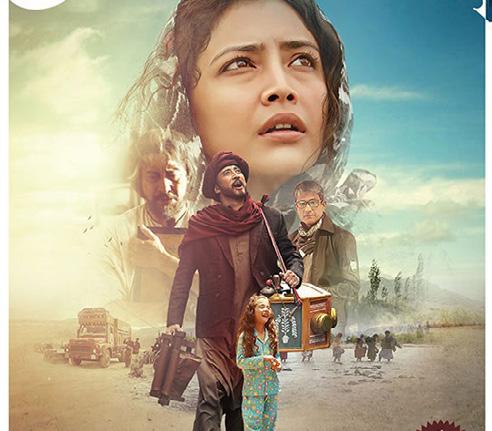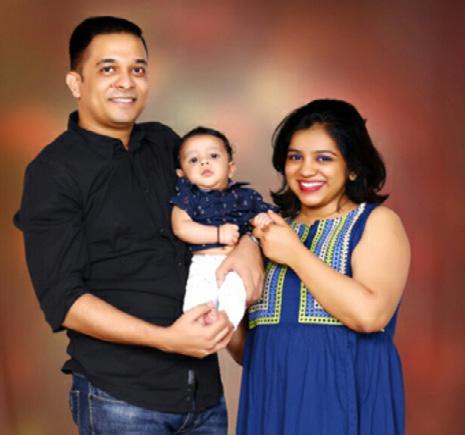
18 minute read
MONEY MATTER $
from 2018-06 Melbourne
by Indian Link
You work for your money, but does your money work for you? As the financial year comes to a close, we ask the question, how well do you know your money?
What comes to mind when you think of the word ‘money’? Issues like ‘salary’, ‘bills’ and ‘expenses’ are possibly the most common, right? Perhaps ‘security’ too, since so many of us associate it with a constant income. Ideas that probably don’t come to mind as often (as they should) are ‘spending habits’, ‘emergency fund’, ‘retirement plans’ – you get the idea.
should be. That’s not to say that we are completely ignorant about financial matters, but do we truly understand how we can manage our money better? And if not, how can we change that?
The obvious answer and the first step is to start talking about it. Talk about what you are doing with your money, where you keep your savings (do you have any?); do you keep track of how much you spend or save; talk about your debt options to reduce it and talk about your superannuation options to grow it; talk about what your financial goals are over the short term, medium term and long term. Don’t neglect retirement goals. What sort of lifestyle do you want in retirement – are you going to relax at home or travel around the world? How financially secure do you envision your (and your family’s) life to be if something were to happen to the income earners in the house?
If you haven’t thought about these questions, now is the time. Indian Link speaks to some people in different phases of life on how they plan their financial life.* $$$$$$$$$$$$$$$$$$$$$$$$$$$$$$$$$$$$$$$$$$$$$$$$$$$$$$$$$$$$$
Whatever the reason, the general consensus is that we are simply not as financially literate as we had to start from scratch here. Our lifestyle was possibly more lavish back home, here we’re a little more cautious about money. Household help is affordable in India, here, it’s unthinkable!
I tend to make most of the decisions, but I do consult with Neha.
Do you have separate bank accounts or joint?
Yes, we’ve always had separate bank accounts, actually. Not deliberately, but it’s just been the case always. But it has worked well for us, because whatever I earn is used for household expenditures and Neha’s earnings go towards savings. How do you resolve conflict when it comes to money?
The best thing to do in most cases is to find a middle path. In other cases, the main question is, ‘do we really need this now?’ If you could cut back on one frivolous expense, what would that be?
Our most frivolous expense is probably eating out, so I suppose we would cut back on that.
What is your plan B in case you can’t work? Do you have an emergency fund, or insurance policies to help out?
Are your financial decisions based on what your family taught you, what your friends tell you, or your own research?
My own research with a little advice from parents.
Do you financially support family in India?
No, both our parents are retired government officials so they’re selfsufficient.
Do you set money aside for your son’s education? Are you aware there are tax effective ways to provide for their education?
How long before you found gainful employment?
Luckily, I (Chinmay) landed a job before I arrived here. We’d decided early on that both of us coming here without jobs (that too with a year-old kid) was simply out of the question.
Was it a challenge to avoid converting dollar into INR for every purchase?
Yes, a big one. We were constantly converting AUD into rupees and at first it was shocking that a kilo of potatoes costs $3 whereas in India, it is Rs.20-30! You have to make a very conscious effort to tune that out.
How do you plan your cash flow (income and expenses)? Do you use a budget planner?
We don’t use a budget planner. Our budgeting is pretty ad-hoc. For instance, if we bought a fridge last month, then there’d be no major buys for the next two months at least.
Do you make financial decisions together as a couple? If not, who does? Did you both decide this is the best option for you?
At one point, we were in a financial slump. We didn’t have an emergency fund per se, but some savings back home (fixed deposits). Luckily, we didn’t need to dip into those. But yes, it has definitely made us create one, should such a situation ever arise again.
Is your lifestyle different here in Australia than in India? Are you financially better off or worse?
Definitely different! I won’t say we are worse off – but we were definitely better off in India. Mainly because we’ve kind of
No, we haven’t really gotten there yet! How will you teach your son about working with money? Vivaan is only two at the moment. But we do plan to give him pocket money – in return for household chores like grocery shopping or doing the laundry. It’s how I was raised too.
Have you thought about wills?
Unfortunately, no. We have maybe had one discussion about having a will made but it hasn’t materialised into anything concrete. From 2 July onwards there is a new Childcare Subsidy that is means tested. Do you understand this fully and how it may impact you?
I do know that there’s a new childcare subsidy program but no, sadly we haven’t taken a proper look into it.
What are your financial goals?
To have a comfortable retirement; have enough money to deal with health problems.
How do you plan your cash flow (income and expenses)? Do you use a budget planner?
I do a budget in Excel. I take a look at it once in a while, though I should manage my budget more actively than I do.
What is your Plan B in case you can’t work? Do you have an emergency fund, or insurance policies to help out?
I have savings put aside that I don’t touch.
If you could cut back on one frivolous expense, what would that be?
Coffee, eating out and dating. Though dating isn’t frivolous, I have it down to an art form. Do you send money back home? Or vice versa?
No. Though I did when I was paying back my student loan. Have you thought about acquiring property before settling into a long-term relationship?
I’m not sure there’s a relationship between acquiring property and a long-term relationship? I would always recommend that women, especially, maintain independent financial stability irrespective of whether they’re in a relationship or not.
Will you discuss money matters with a prospective partner? Will their attitude to money be an important consideration?
Absolutely. I’d need a long-term partner to be reasonably financially secure with the ability to take care of himself. I’d also want him not to have any hangups about me earning more, because it’s very likely that I will. Do you deal with your finances differently as compared to your non-Indian friends? How does it differ?
I’m not sure I spend money similar to most Indians; my life is quite different to most Indian women/people my age.

I’m single, and spend way more money on coffee, dumplings and in Bunnings than I should. When choosing a job or career, which is more important: job satisfaction or income? Has this always been so?
For me, it is more about an opportunity rather than satisfaction as such. I would definitely turn down more money if the organisation offering the role violated my personal ethics.
I’ve not actively thought about earning more money, but I have been privileged in a way that the work that I do is financially well compensated, so I don’t have to choose between the two. Do you use your credit card as a tool for getting by during the month (repaying it at the end) or do you accumulate debt because you spend too much?
I spend too much. I should just cut my credit card up and throw it away.
Do you use any tax saving methods? Are you aware of them?
Nope. I don’t spend any time thinking about tax, other than getting my tax return done. Tips and tricks you use to curb expenses and stop spending and start saving?
Leave the credit card at home or skip one altogether. Do a budget and identify where you spend most money. Coffee, eating out, buying unnecessary stuff seems cheap but adds up in the end. Check your bank account regularly: it gives you a sense of control over how much you’re spending, and you can correct the course you’re on instead of realising it after you’ve spent too much. It’s good advice that I should follow more closely. What do you understand about wills or estate planning? Do they allow you to will stuff to your cats? I should find out. On a serious note, no I don’t.
How do you plan your cash flow (income and expenses)? Do you use a budget planner?
The first thing I learnt was, no matter how much we say money is not important, at the end of the day we all need it to live a decent life and pay our bills. I plan my budget meticulously. Top of the page is my monthly income and down below are the expenses. After noting down all the bills and direct debits, I also note my petrol expenses, grocery, daily coffee money, medicines, extra unknown expense (always put aside $200) plus I have my savings. Does your ex-partner support you financially?
No, never has, never will.
Do you think women should learn more about managing their finances?
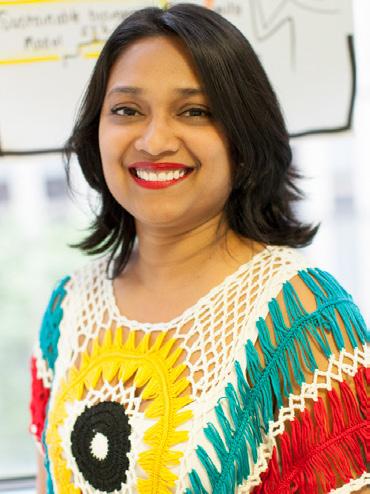
Let my life experience be a lesson to all women out there. Yes, it is very important for all women to be aware of their finances and to manage them. From someone who had never dealt with money matters, to have to learn to budget even for the smallest daily expense, has been quite a journey. But it’s a journey that has made me stronger and more aware financially.
When my ex-husband just took off (he was untraceable), I had no clue of where to start. In today’s world, if women can go out and work full time, they should also be fully aware of their financial situation. This is the first step to independence. When women say “I have no idea of our finances, my husband does it all” I don’t think this is something to be proud of. Know your finances and be in control of your own life.
What is your Plan B in case you can’t work? Do you have an emergency fund, or insurance policies to help out?
Unfortunately, no insurance policy but I do have some extra money in my home loan in case I need it for emergency reasons.
Name one financial challenge you face often. How do you overcome it?
When my boys were younger and at school, it used to be extra expenses like school camps or even just buying them sports gear. But I always budgeted for it and had some extra money end of the month stacked away. Now that the boys have grown up and are both working, the challenges are different. Now it’s more about thinking for the future, ensuring that I keep something aside for my old age, and having that extra bit for the unknown. I overcome this challenge by being responsible with my money. I live within my means and have never felt like I am depriving myself. Tips and tricks you use to curb expenses and stop spending/start saving?
I never deprive myself of small pleasures. Always keep some money aside for catch-ups with friends or an occasional movie/ dinner night. Never over-do what you can’t afford. Every week, I take out $50 as my own pocket money. I keep it aside and it surprises me when it all adds up in a few months. I am not a shopaholic. I buy clothes/ shoes when I need to. I have thinned out my cupboards and don’t hoard. It is such a satisfying feeling. Did you set money aside for your kids’ education?
When my boys were younger, yes, I always set money aside for their education. Both my boys went to TAFE and took HECS. I think it’s a brilliant system that teaches our children to be more responsible and to value their money.
Are you wishes for the kids written down somewhere?
I do have a Will done up by a lawyer. I just feel this is so important. Life is unpredictable and it’s always good to be prepared. What did you teach your children about working with money? My boys used to get pocket money when they were younger but not a lot - $20 a fortnight. They would save it up to buy an Xbox game or something. Now that they are both working, they too respect their money and only spend within their means. It makes me very proud to say that neither of them owns a credit card.
What kind of investments do you have and how often do you review them? Do you manage them yourself, or with a professional’s help?
We do have a couple of investments in real estate, and we review them as per the market to sell or to add on. Given I’m in the profession, it’s easy.
Do you make financial decisions together as a couple. If not, who makes them?
Did you both decide this is the best option for you?
I (Ash) do the research and discusses everything with Manisha. We talk about all the possible outcomes and then jointly make decisions.
Do you financially support family in India?
Yes, we do.
What do you teach your children about working with money?
The best way to teach children about money is to give them responsibility for it. So our kids have their own bank accounts. It’s good for them because they get an idea of how banking works and how they should save or spend.
What are your thoughts on HECS?
It is incredibly useful for parents. We don’t have to worry ourselves sick about paying exorbitant fees. And a huge advantage is that the children are learning to pay back what they borrowed.
What do you understand about Wills or
Estate Planning? Do you think having a will is a smart choice?
All parents, whatever their economic standing, should have a will in place that protects their children with their share. Tips and tricks you use to curb expenses and stop spending / start saving? Our mantra is to spend on what’s needed. (And for me to not let go of Manisha’s hand at the shopping centre!) about planning finances, what would it be? expenses and stop spending / start saving?
Do you think about retiring in Australia? Yes, this is home now.
Have you made retirement plans or discussed the funding of your retirement plans?
Yes we have, and if it all goes as planned, we could enjoy the same lifestyle as we do today.
Start thinking about your financial journey early on. Better to get a foot into the property market by buying wherever you can afford, and then upgrade later on.
If you had stayed on in India, would you have been financially better off or worse?
Firstly, don’t overdo anything. Second, plan well. For instance for my travel trips I plan six months in advance. I’m off to Nepal and Bhutan in September, but it is all booked and planned. What are your thoughts on wills and estate planning?
Would you say you’ve achieved your financial goals?
Yes, I think I have achieved my financial goals reasonably well. I’m 78 years old and continue to work, but only because it gives me much joy. I came to this country in my late 20s to do a PhD at Monash University. I worked as a chemical engineer in Canberra and in Sydney and retired from full-time work in 1997. A few years before that, I stumbled onto acupuncture as a means to treat a neck problem. I took it up with a passion, studied it, and have been working part-time since my retirement as an acupuncturist. Somewhere along the line I made a decent investment in property which worked well.
Do you rely on Australian pension, or are you self-funded?
It’s a combination of Super, part pension, and my own work.
Did you plan your retirement in detail?
Not really, it all just happened, but luckily it happened well. I did not ever think I would be working as an acupuncturist in my retirement, but I have had repeat clients, some of them for eight years.
Are you dependent on your children for financial support?
No. Both our sons are financially well-settled. Both did brilliantly at uni, went on to rewarding careers and have made excellent financial decisions for their own families.
If you had to give one piece of advice to the younger generation
My cohort at Roorkee University, nearly all of who went on to great jobs such as professors in university, retired at 58-60 as is the norm in India. Pensions there have gone up significantly now and they are all quite comfortable. Would I have been better off financially? It’s hard for me to say, but I reckon I would have been ok.
Are you ok with splurging now and then on luxuries like travel?
Most definitely. Bindu and I enjoy our travel twice a year, sometimes three times. Just got back from Mongolia! I’ve now travelled to every continent except Antarctica, and am looking forward to going there – even though I’ve been to the Arctic Circle.
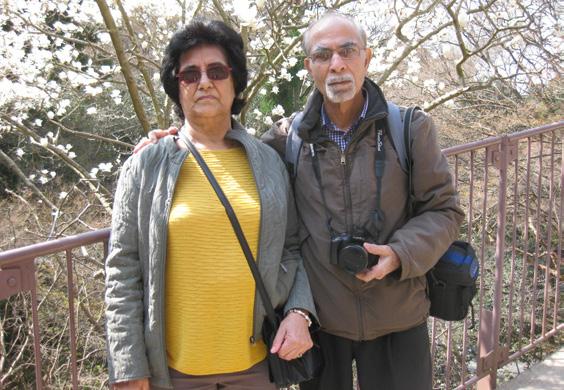
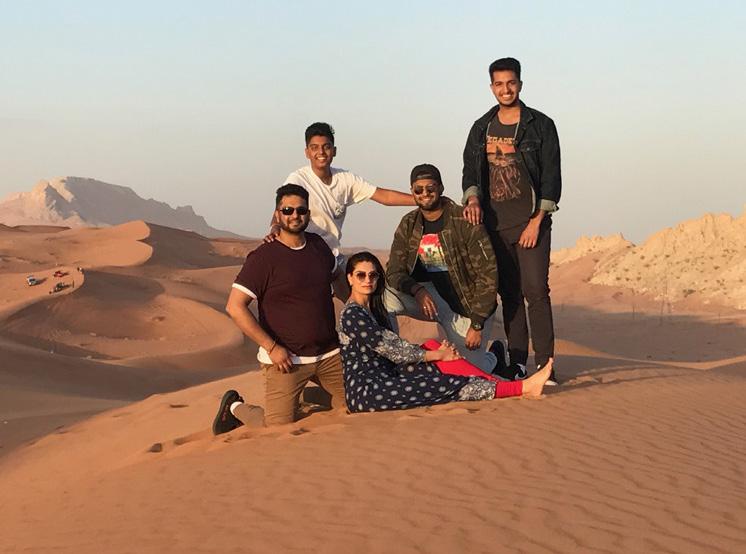
Tips and tricks you use to curb
I have a fair bit of experience on this, both here and in India. I’ve had to intervene in a major way to help one of my closest and earliest Aussie friends here. His life was in shambles in his old age; he lost his wife and only child and then made some poor decisions in his dementia (or had them made for him by supposed carers). It took a court case and many hours on my part to sort that out. And then in India, issues from own my family property settlements taught me many lessons. Today Bindu and I have a will, which we prepared ourselves but had a lawyer look through and fine-tune. Both our boys have seen it and fully understand all the intricacies involved. I think it is very, very important to have this sorted out.
SINGLE MAN Sumit Sharma (IT Project Manager)
What are your financial goals?
I’d like to start a property portfolio to generate income once I’m retired. This starts with one house and by the time I’m 40, I want to have at least two properties – I’d also like to invest in property back home in India. Another one of my goals is to have a healthy Super account which will help provide income in retirement.
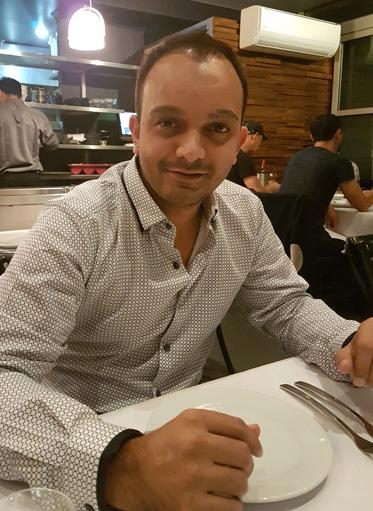
How do you plan your cash flow (income and expenses)?
Do you use a budget planner?
I budget every month. I know what my usual expenses are so I set money aside for those at the beginning. I also keep a buffer amount for any unexpected expenditures and whatever remains in the end goes straight into my savings account. I use an app called budget expense report where I key in my income and expenses and that tells me how much I’ll end up saving after a certain amount of time. It’s a good planning tool.
Do you have an emergency fund?
Yes, I do. I created one by taking certain things into account: my parents’ medical expenses, any unanticipated health expenses I might have, unplanned travel to India, or if I lose my job –there should be enough in the emergency fund to take care of any or all of these things.
Do you send money back home?
Yes, I do. I contribute towards my parents’ healthcare. I also send them money now and then for them to travel someplace. It’s not a lot, but I like to do something for them when I can, especially when they’ve done so much for me.
Have you thought about acquiring property before settling into a long-term relationship?
Last year, I had been thinking about buying a unit, but I really didn’t like the designs so I put the idea on hold. Now that I’m 34, I don’t know if getting a ‘bachelor pad’ makes any practical sense, so I’ve decided to buy a house after I get married. Will you discuss money matters with a prospective partner?
Will their attitude to money be an important consideration?
Yes, I would like to discuss money matters with a prospective partner. I think transparency with regards to money is especially important in a relationship. That way, we’ll both understand each other’s attitudes towards money as well. I’d like to give my partner an idea of my financial situation –my liabilities, loans, etc. It’s only fair to give her a heads up! And of course, her attitude to money is an important consideration, I would want to make sure she fits into my plans as well as I do in hers, right?
When choosing a job or career, which is more important: job satisfaction or income?
Job satisfaction, without a doubt. I need a job that motivates me to get out of bed every morning. It’s not that money isn’t important, but what’s the point of earning money if it takes the joy out of everyday life?
Do you use your credit card as a tool for getting by during the month (repaying it at the end) or do you accumulate debt because you spend too much?
I used to use my credit card to spend, but not anymore. Now I use it as a fall back for any unexpected expenses. And I keep a cap of $3,000 on it. Do you use any tax saving methods? Are you aware of them?
As a self-employed person, I can put some expenses through my business which helps with cash flow. Make sure you have a good bookkeeper or accountant who can advise you! I also make additional contributions to Super on a pre-tax basis. This helps grow your super AND save in tax. And lastly, I use many of the tax concessions available in Australia to reduce my taxable income, like donating to charities like World Vision and UNICEF. Tips and tricks you use to curb expenses and stop spending and start saving?
I’m a bit of an impulsive shopper, so I just try to weigh what I need against what I want. It’s pretty much the only trick I have!
$$$$$$$$$$$$$$$$$$$$$$$$$$$$$$$$$$$$$$$$$$$$$$$$$$$$$$$$$$$$$$ policies to help out?
We do have an emergency fund which we won’t touch under any circumstances for day-to-day expenses or even out-of-the-blue ones. Also, Mohan has income protection to keep us afloat in case things go south (touch wood)!
If you could cut back on one frivolous expense, what would that be?
Shopping for homeware. Both of us love decorating our home and we keep buying stuff wherever we go!
How different is your lifestyle here as compared to when you were in India? Are you financially better off or worse?
How do you plan your cash flow (income and expenses)? Do you use a budget planner?
We use Excel sheets to plan our upcoming expenses and prioritise them as per the need of our family. How do you resolve conflict when it comes to money?
For us, what works is that both of us have the power of veto to negate any expense. So any expense we make is a mutual decision. This especially helps when we have to cut down on extra expenses. It also puts us in perspective of our priorities. Do you make financial decisions together as a couple? If not, who does? Did you both decide this is the best option for you?
We take all our financial decisions jointly and so far it is working well for us.
Do you have separate bank accounts or joint? Why or why not?
We have separate bank accounts since each one of us handles different payments. But both our accounts are offset accounts and we have passwords to each other’s accounts.
Have you thought about wills?
We recently met with a Financial Planner and are in the process of putting a will in place.
What is your Plan B in case you can’t work? Do you have an emergency fund, or insurance
We are at a different stage in life now than when we were in India. We did not have a child then so it was definitely different. Financially, we feel that we are the same as we were back in India. Are your financial decisions based on what your family taught you, what your friends are doing, or your own research?
We continue to learn. Our base was definitely built by our families but we continue to evolve by doing our own research and with conversation with friends.
Do you financially support family in India?
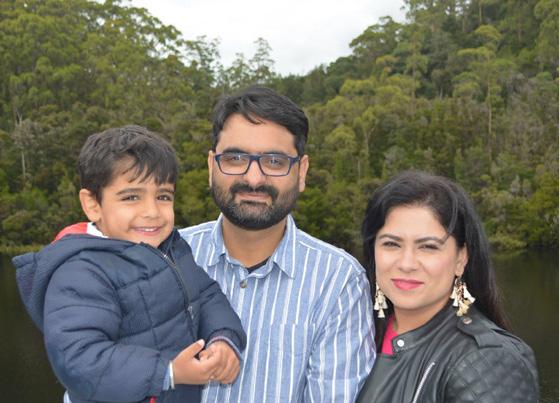
No, we do not have to support our families back home.
Do you set money aside for your son’s education? Are you aware there are tax effective ways to provide for their education?
We haven’t set money aside for our son’s education but we have made investments for the same reason as financial investments give better returns than tax savings.
Will you teach your children about working with money?
He is only 3 so we haven’t really gotten there yet. Only recently we have started introducing him to the concept of money.
From 2 July onwards there is a new Childcare Subsidy that is means tested. Do you understand this fully and how it may impact you?
Yes, we aware about the new changes being introduced. For us it means that percentage benefit along with hours covered goes down, but the annual limit increases.




